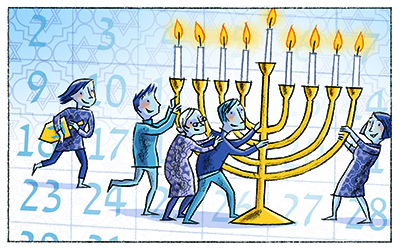Being Jewish
Commentary
Celebrating Hanukkah on Your Own Schedule

The sages of the Talmud ask, “What is Hanukkah?” You would have thought they would have agreed on the meaning of the holiday, but no. Was it the theme of a miraculous victory of the rebel army? Was it the miracle of the oil? Was it the endurance of the Jewish people? At least they did not ask, “When is Hanukkah?” The sages settled on eight days in the Hebrew month of Kislev. Until recently, Jews who observed the holiday respected these days as the time for sacred observance.
I turn to the calendar provided by my local Jewish funeral parlor to find out the holiday’s corresponding secular dates; this year it begins the evening of December 2. But for a growing number of Jews, those dates are losing their authority. Like Christmas, Hanukkah has become a season, and it has a new practice in the United States: gathering with family and friends to light the menorah when it is convenient.
Big kids not home yet from college? Grandchildren not visiting until their winter break? Away on vacation? No problem. Hanukkah is when you say it is. Forget the authority of the sages; forget the feeling of knowing you are lighting your menorah on the same days as Jews worldwide.
When a new Jewish practice makes me uncomfortable, and this one does, I first try to remember how uncomfortable other practices made me initially. It once was jarring to see women wearing prayer shawls or chanting from the Torah. But soon I was the one wearing a tallit and chanting. I now take these and other practices for granted, as if they have been around since forever.
Second, I look to traditional sources that might help me see the new practice in a better light. In this case, there is one, the second-chance holiday called Pesach Sheini. In Numbers 9:6-11, we learn that a one-day, do-over Passover was instituted for those who missed making a proper Passover sacrifice because they had become ritually impure or because they were on a journey. Such people should “keep the Passover unto the Lord, in the second month on the fourteenth day at dusk they shall keep it; they shall eat it with unleavened bread and bitter herbs.” The Torah is compassionate but, admittedly, it is not loosey-goosey: Those without an excuse for missing out on Passover are shunned.
Third, I listen to the rationale of those who are observing the new practice. Some say that observing a beloved tradition together with family and friends overrides the claims of the calendar. Others say that celebrating Hanukkah on a more convenient day is better than not celebrating at all. I’ve seen this in action when my secular Jewish neighbor invites me to her Hanukkah celebration, which always takes place in late December when her whole family is in town. Her house persuasively shouts Hanukkah: the table covered with menorahs and candles and her husband’s collection of dreidels, her grown daughter frying latkes and making applesauce, her son’s children proudly singing the blessings in Hebrew they learned from a video, gifts in Hanukkah-themed wrapping paper waiting to be opened. I might be standing smugly on ceremony, but I admit that in this household, Hanukkah is being robustly and joyously observed. In its own way. Not my way, but my neighbor’s.
If Hanukkah is a holiday that celebrates Jewish endurance, is this not one vision of what it looks like?
Rabbi Vanessa L. Ochs is a professor of religious studies and teaches in the Jewish studies program at the University of Virginia. She is the author of Inventing Jewish Ritual.








 Facebook
Facebook Instagram
Instagram Twitter
Twitter
Ciaran Blumenfeld says
I am always a little depressed when Hanukkah happens before Christmas, and more so this year when my college age daughter will not home until after it ends. This year my own (and my husband’s) travel schedules have taken us out of town for the holiday. My father has been unwell and unable to come over for Latkes. In all honesty, I’ll barely recover from jetlag, and get the decor up before it is all over. I’ve resigned myself to fry up a storm for the last night of the holiday, with or without the rest of the family… I have to admit, there is a compelling argument here for celebrating/marking this holiday on your own time. Perhaps I can keep the Hannukah holiday spirit alive a little longer this year. For me, it makes sense. Hanukkah is not a religious holiday for us. It’s more of a celebration of independence. Perhaps a little independence from the strict holiday calendar is just what our household needed this year.
Moe G. says
Wow. Such a sad article. It is quite depressing to see a person who teaches religious studies to see Hanukkah in such a external way of merely lighting some candles and eating latkas. Hanukkah is an extremely deep holiday where we celebrate, as Ciaran Blumenfeld writes, “a celebration of independence”. Not independence from “the strict holiday calendar” but from the non-Jewish culture that the Greeks wished to push on us. The fact that the author of this article wants to play around with the dates of the holiday in order to make it co-exist with the non-Jewish holidays and vacation dates show that she has thoroughly missed the point. Hanukkah is the holiday in which a Jew says “We are different and we won’t have others push their culture and idea on us”. There’s absolutely nothing wrong with celebrating Hanukkah during the time when Jews all over the world are doing it and keeping our Jewish identity strong and then when vacation rolls around having some quality family time together doing non-Hanukkah activities.